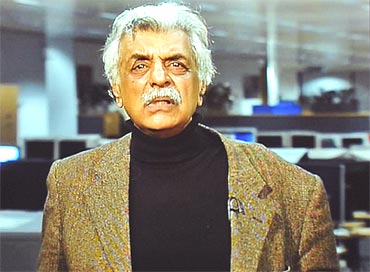 The United States and its North Atlantic Treaty Organisation allies, by imposing on Afghanistan the corrupt regime led by Hamid Karzai, had stoked an angry insurgency that till then was essentially local, says Tariq Ali, editor of the Britain-based New Left Review and author of such books as Clash of Fundamentalisms: Crusades, Jihads and Modernity.
The United States and its North Atlantic Treaty Organisation allies, by imposing on Afghanistan the corrupt regime led by Hamid Karzai, had stoked an angry insurgency that till then was essentially local, says Tariq Ali, editor of the Britain-based New Left Review and author of such books as Clash of Fundamentalisms: Crusades, Jihads and Modernity.
Speaking April 19 on the 30th anniversary of the London Review of Books at a New York event, Ali said the consensus among the people who went from the US was that the bulk of the people did not want them. He cited Karl Eikenberry, the US ambassador in Afghanistan, who warned that bringing 30,000 more troops into Afghanistan was counterproductive, given an unavoidable increase in civilian deaths, pushing swathes of Pashtuns into the insurgency. Ali was speaking via satellite because flights from Britain had been affected by the volcanic eruption in Iceland.
Things could have improved after the 2002 invasion if the occupiers had tried to really fix the wrecked social infrastructure of the country. But the neo-liberals in the Bush administration running the show were not likely to do that at a time that privatisation was the buzzword in the US. The result is was a sharp increase in the poverty levels, often visible in Kabul in the form of slums, and in wealth, observable in the number of expensive villas popping up.
But, Ali said, there were no other candidates other than Karzai from southern Afghanistan, where the majority of the people live. To replace him with a leader from the north, such as politician Abdullah Abdullah, was not going to work.
That, said Ali, was why Peter Galbraith, former deputy chief of the United Nations in Kabul, was kicked out after he pushed the UN representative in Kabul to act on claims of election fraud by Karzai without having an alternative leader lined up.
That reality also drove General Eikenberry to warn against removing Karzai, he said. Karzai, too, recognised the helplessness of the US and threatened to join the Taliban if he was ousted.
The situation in Afghanistan did not sound as rosy as pictured by US authorities if one read the vernacular press in Pakistan though they also found their way abroad at times, he said.
Citing an example of increasing civilian deaths -- including one cover-up bid in which soldiers dug bullets out of people in a family they mistakenly shot -- Ali said General David Petraeus, commander of the United States Central Command, who gave the order for the surge should be held accountable.
"They've now discovered there is a good Taliban and a bad Taliban," Ali said, to laughter from the audience. "The good Taliban are essentially those directly controlled by the Pakistani military and [and run] by [Mujahideen chief] Gulbuddin Hekmatyar The bad Taliban says 'we are prepared to be part of a national government but once all foreign troops are gone."
And the Northern Alliance takes orders from Russia, making any deal contingent on the Russians being in agreement, Ali said.
"There are many veterans of the [1979] war in Afghanistan who are feeling a sense of schadenfreude. They're saying, well, it happened to us. Now, it's happening to you [the US]; you have to get out. That is what the Russian press is reporting."
Like the Russians and the British, the only way out is for NATO to leave the country, he said.
He said that hopes of setting up a strong Afghan army and police force were often cited but there was no guarantee of the loyalty of the personnel.
And for any solution to work, Pakistan could not be excluded, Ali said, not least because a great many Pashtuns, who live within Pakistan but don't recognise the Afghan-Pakistan border, would be up in arms. The Pakistan military would be a key player in any decision taken on Afghanistan -- along with Iran, Russia and China.
The only solution for the US was to leave, after which its European allies in Afghanistan could follow suit, he said.
In the question and session that followed the speech, an Indian (who wished to remain unnamed) asked if Afghanistan was a Central Asian problem or a South Asian one, especially given the fact that India was the second-biggest donor to Afghanistan and had a lot of influence there.
Both, replied Ali, pointing out that Afghanistan was a bridge between the two. He said like the Chinese, Russians, Iranians and Pakistanis, the Indians had a crucial role in helping Pakistan, because they could also help economically after creating conditions that would keep war at bay for ten years during which the country could be rebuilt.






 © 2025
© 2025